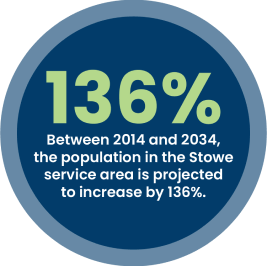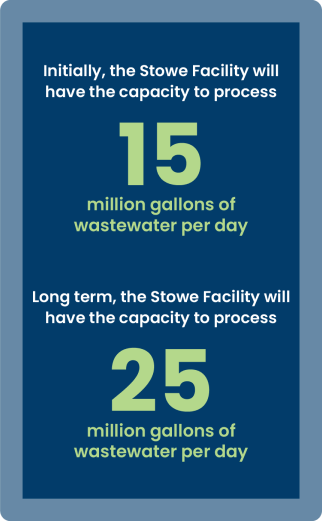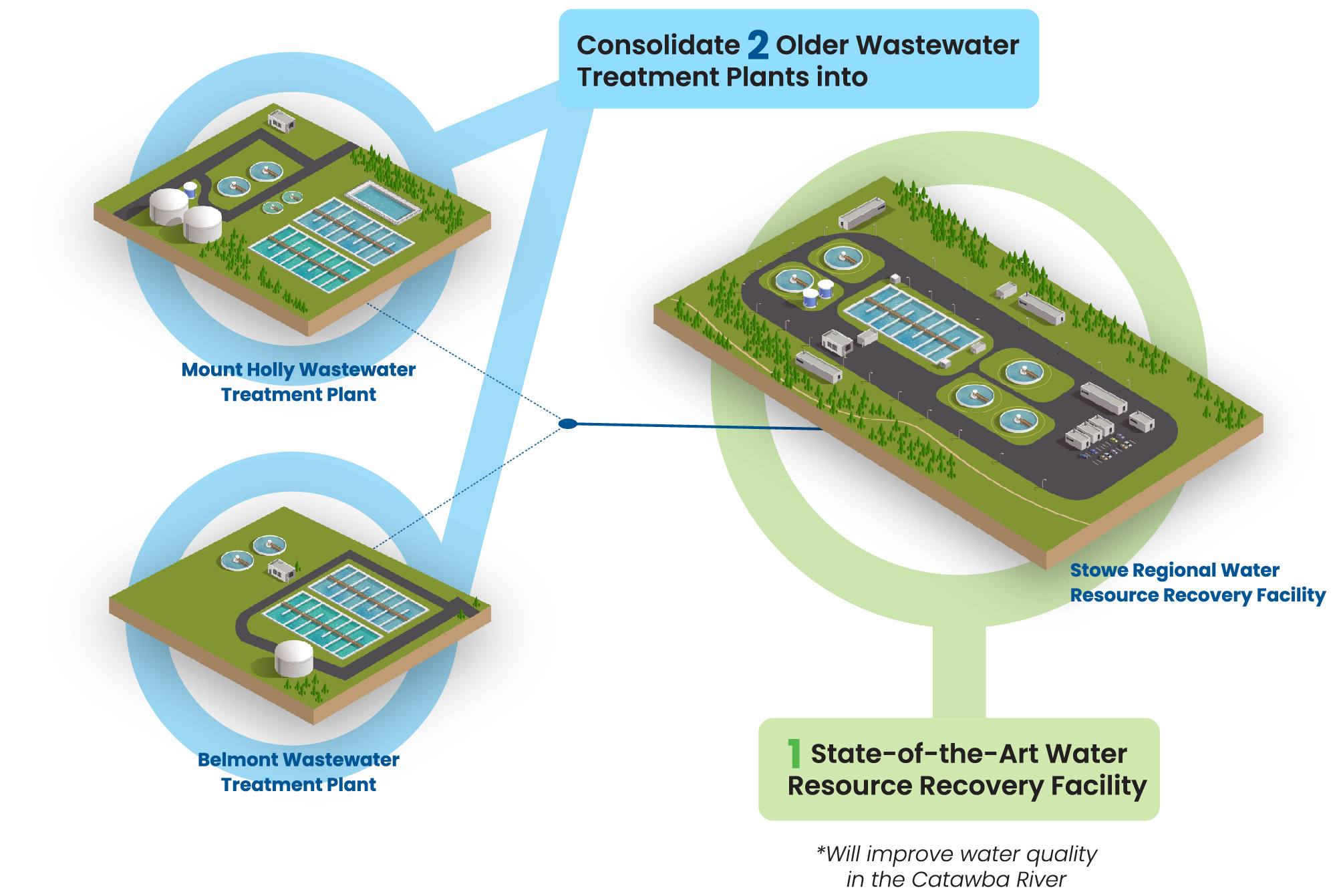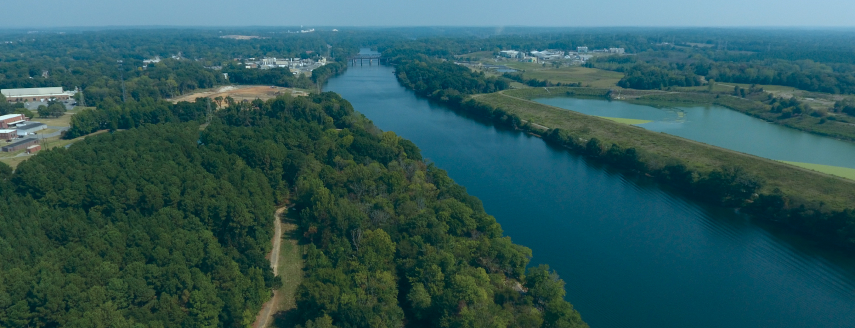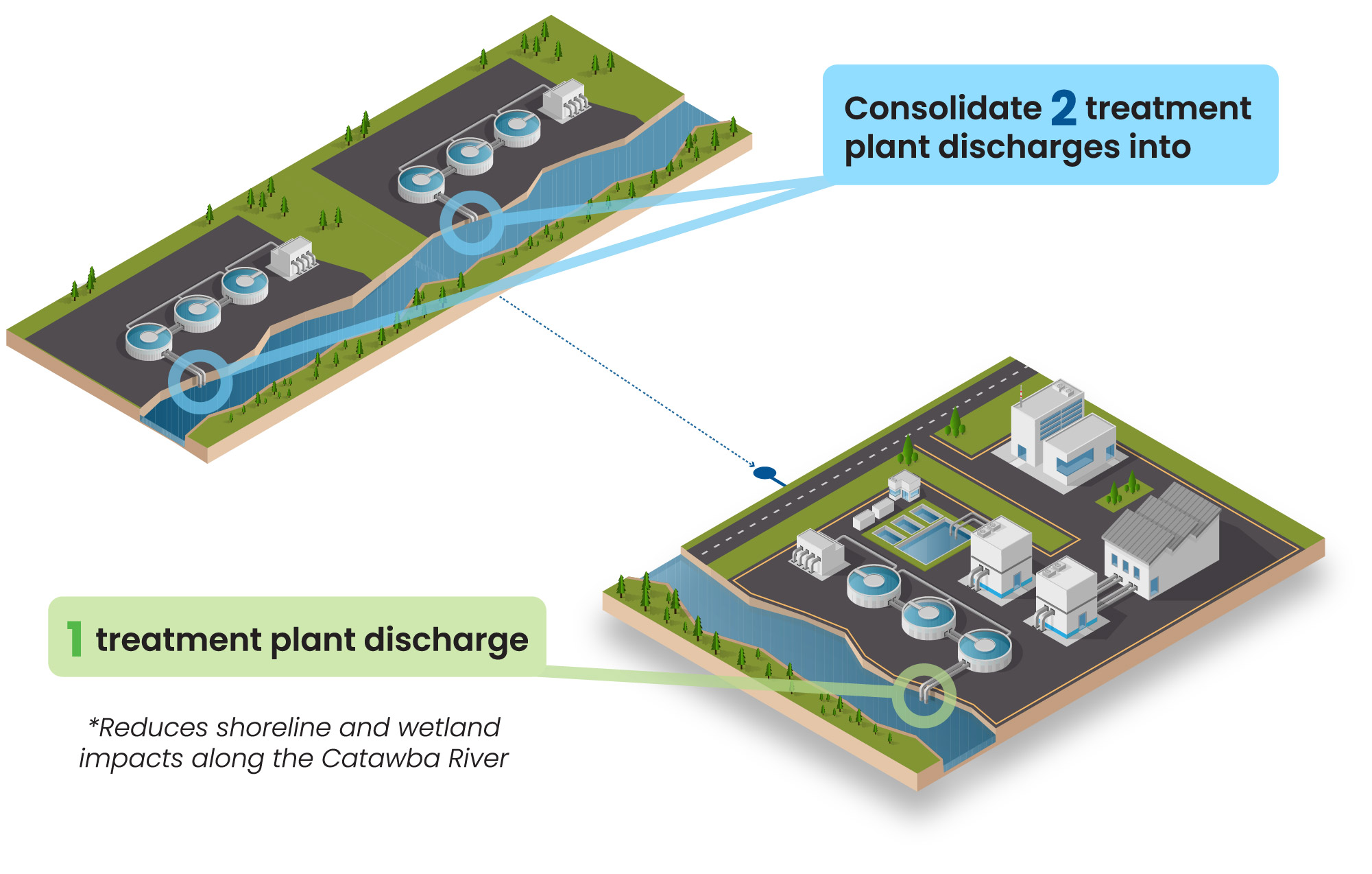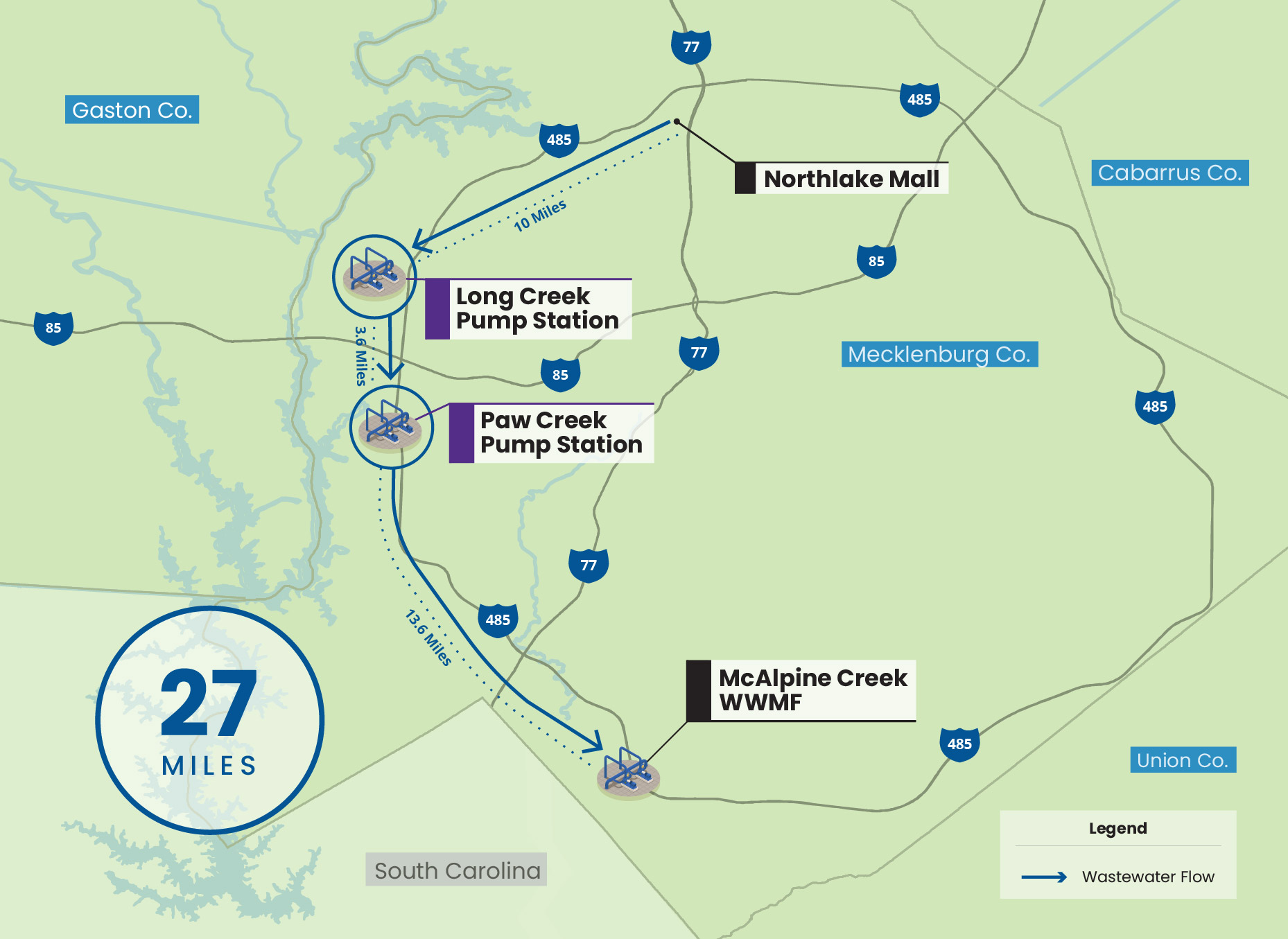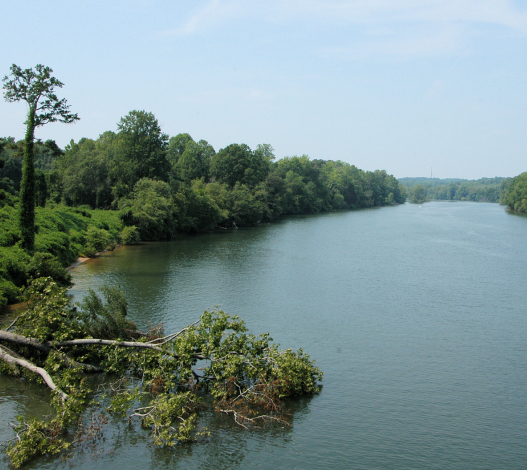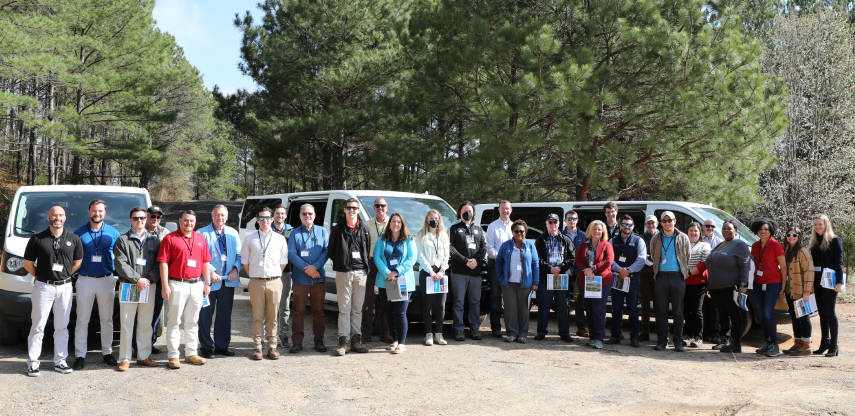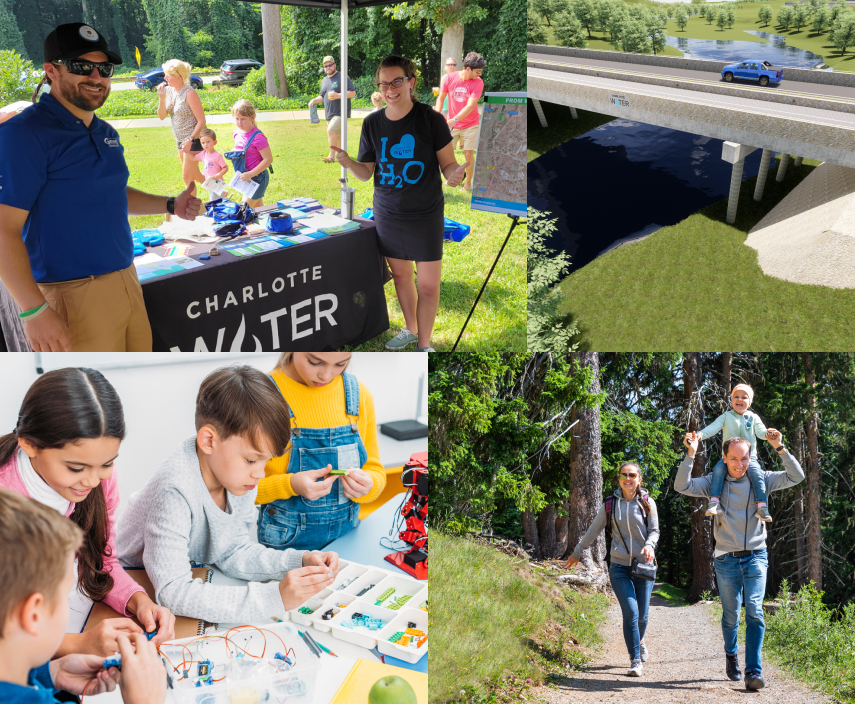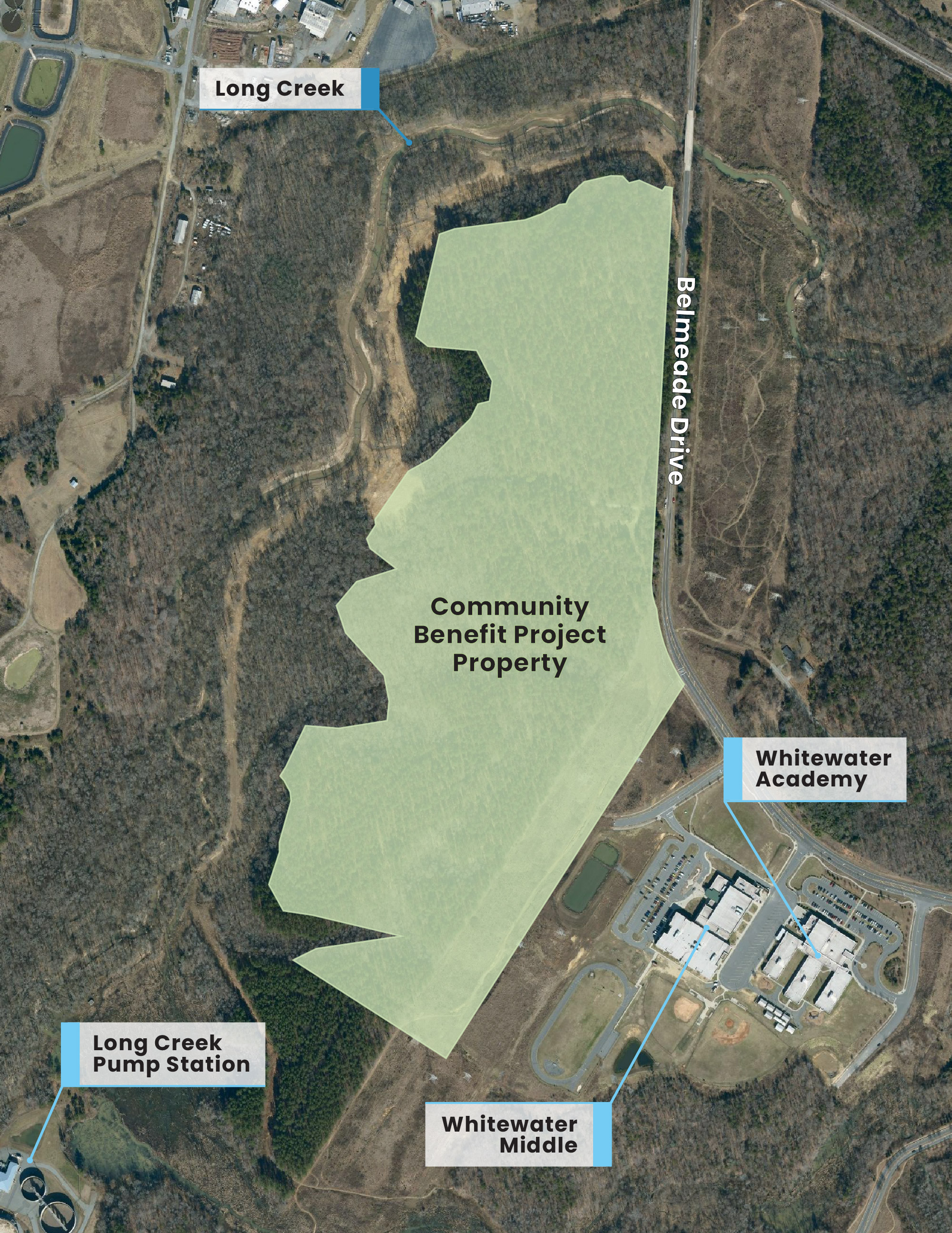Project Overview
Our region is growing quickly and that means there will be more wastewater that needs to be processed and treated. Charlotte Water is building a new state-of-the-art wastewater treatment facility to serve northwestern Mecklenburg County and the Cities of Belmont and Mount Holly in eastern Gaston County.
The new Stowe Regional Water Resource Recovery Facility will provide Charlotte Water with the additional capacity and technology needed to process and treat the increasing amount of wastewater produced by our region.
The Stowe Facility will be located along the Catawba River in Mecklenburg County, close to where the Catawba River and Long Creek meet. Right now, engineering and final design are underway and construction activities have started. We expect construction to be finished by 2026.
Interactive Project Map
The Current Situation
Currently, wastewater from northwestern Mecklenburg County is being pumped 20+ miles to be treated at the McAlpine Wastewater Management Facility in Pineville.
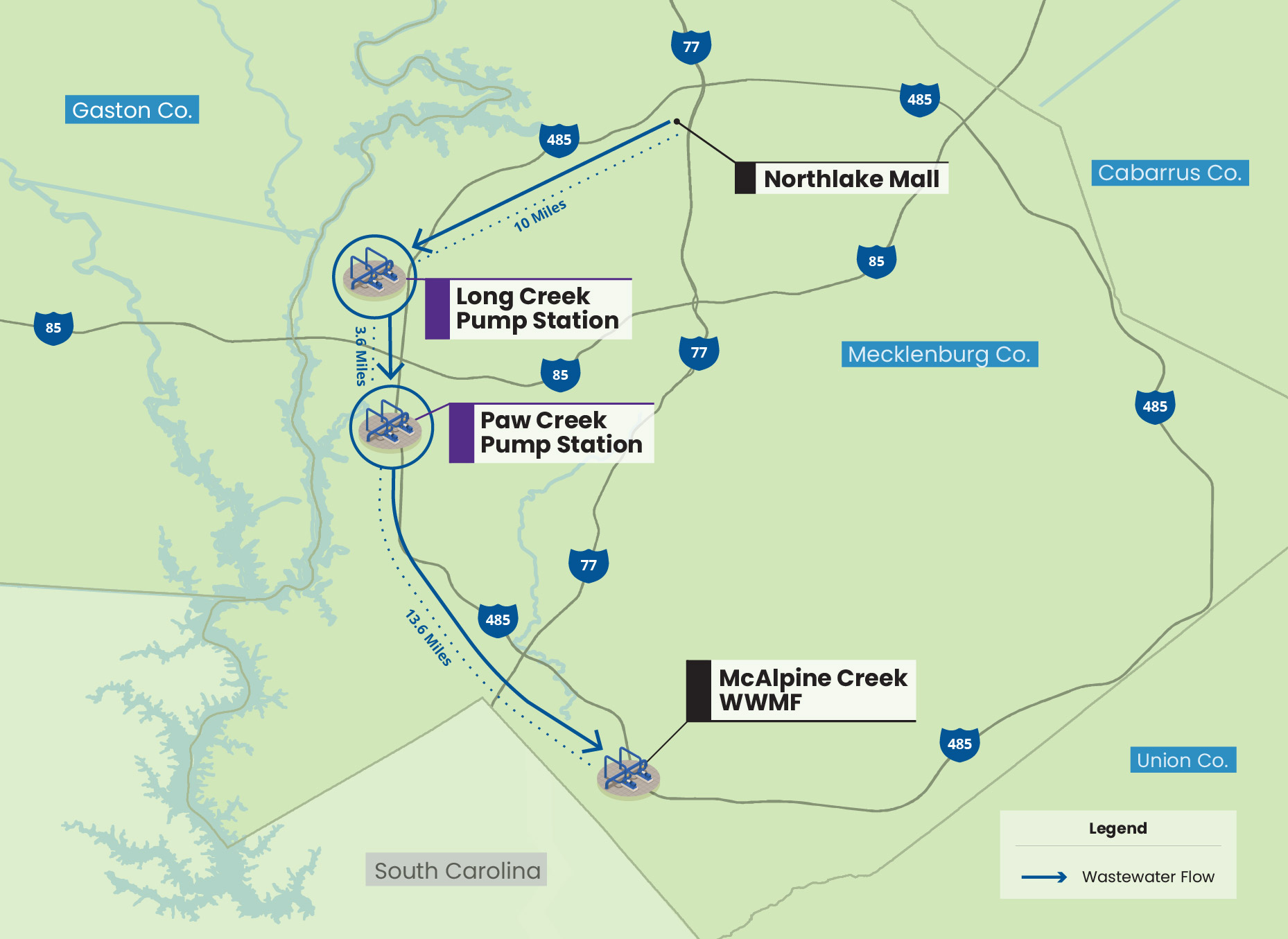
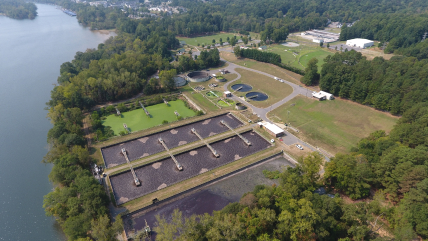
Existing Mount Holly Wastewater Treatment Plant
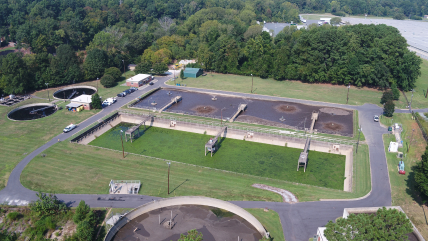
Existing Belmont Wastewater Treatment Plant
In eastern Gaston County, Mount Holly and Belmont are both currently operating their own municipal wastewater treatment plants along the same section of the Catawba River to provide wastewater treatment services for their respective citizens.
What Will This Project Do?
-
Build a new state-of-the-art wastewater treatment facility
-
Streamline wastewater treatment services by replacing two aging municipal wastewater treatment plants
-
Build two new pumping stations to transport wastewater from Belmont and Mount Holly to the new Stowe Facility.
-
Retire the existing Mount Holly Wastewater Treatment Plant and the Belmont Wastewater Treatment Plant
-
Provide more localized wastewater treatment for Charlotte Water customers in northwestern Mecklenburg County
What Would Happen If this Project is Not Implemented?
If the new Stowe Facility is not constructed, the existing Belmont and Mount Holly Wastewater Treatment Plants would need extensive and expensive upgrades and expansions to remain in use due to growing wastewater needs and stringent treatment regulations.
If the new Stowe Facility is not constructed, Charlotte Water would need to complete a large-scale collection system replacement project in order to continue pumping wastewater from northwestern Mecklenburg County to Pineville. This collection system replacement project would involve replacing 20+ miles of underground wastewater pipelines, which would be costly and have significant construction impacts to the surrounding communities.
The Benefits
Please click on the icons below to learn more about the benefits.

The Project
The Stowe Project will allow Charlotte Water to provide regional wastewater treatment services for communities in northwestern Mecklenburg County and the cities of Belmont and Mount Holly in eastern Gaston County.

Project Planning Timeline
Project Components
There are several components that will be constructed as part of the overall Stowe Project.

Stowe Regional Water Resource Recovery Facility
The Stowe Regional Water Resource Recovery Facility will be a new wastewater treatment plant operated by Charlotte Water and located along the Catawba River in Mecklenburg County.
The facility will provide wastewater treatment services for communities in northwestern Mecklenburg County and the Cities of Belmont and Mount Holly in eastern Gaston County. Initially, this facility have the capacity to process up to 15 million gallons of wastewater per day and long-term this Facility will be expanded to have the capacity to process up to 25 million gallons of wastewater per day.
Charlotte Water is building two access roads to provide dedicated access to the new Stowe Facility and the Long Creek Pump Station. The Northern Access Road will begin at Belmeade Road and will follow the existing power line corridor to provide access to the Long Creek Pump Station. Since the new Stowe facility is located on a secluded peninsula along the Catawba River and directly across Long Creek from the existing Long Creek Pump Station, a Southern Access Road will be constructed to link the Long Creek Pump Station and the Stowe Facility. The Southern Access Road will include a bridge over Long Creek that will include a multi-use path for bicycles and pedestrians to improve public access to the River. During construction of the bridge, kayaking and fishing in Long Creek will be restricted.
While the permanent access roads are being built, construction traffic will access the site through an existing industrial park off Belmeade Drive (via Southern Dyestuff Drive) and through the Long Creek Pump Station via Whitewater Center Parkway and Hawfield Road.
Construction Schedule: 2022 - 2026
*Please note that schedules are approximate and subject to change
Trails
There are three trails located on Charlotte Water’s property that needed to be closed for public safety during the construction of the project: the Whitewater Center’s Tortuga Trail and Needle Trail, and the Carolina Thread Trail’s Long Creek Preserve Trail. The Whitewater Center has built the new Field Trip Trail to offset the closure of these trails.
The project will have no impact on the A&E Riverfront Trail or Riverhawk Greenway in Mount Holly.
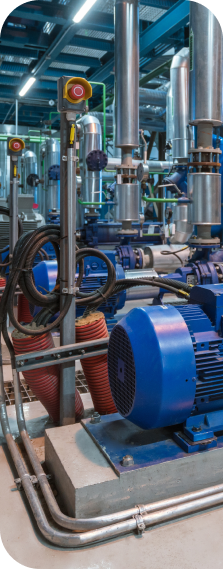
Long Creek Pump Station
The existing Long Creek Pump Station will be upgraded and a second facility called the Stowe Headworks and Influent Pump Station will be built next to it. These facilities will collect incoming wastewater flows from Mount Holly and northwestern Mecklenburg County and process them through the first two steps of the primary treatment stage of the wastewater treatment process. New force mains will be installed under Long Creek to transport the partially treated wastewater to the new Stowe facility for the completion of the wastewater treatment process.
The Long Creek Pump Station is located at the end of Hawfield Road off Whitewater Center Parkway, past the overflow parking lot. The Long Creek Pump Station will be connected to the new Stowe facility access roads by a bridge over Long Creek. A new permanent entrance road will be constructed off Belmeade Road. While the permanent road is being built, construction traffic will use the existing access via Whitewater Center Parkway and Hawfield Road.
Construction Schedule: 2022 - 2025
*Please note that schedules are approximate and subject to change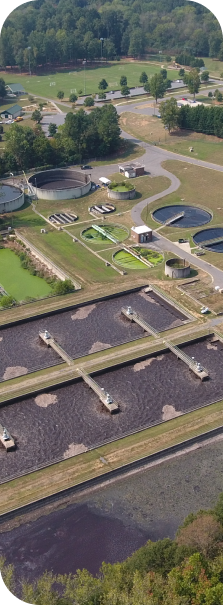
Mount Holly Pump Station
A new pump station and force main infrastructure to connect with the Charlotte Water collection system will be built on the site of the current Mount Holly Wastewater Treatment Plant.
The site of the new Mount Holly Pump Station is located on the same property as the existing wastewater treatment plant at Tuckaseege Park. Construction traffic is using a new temporary access road off Tuckaseege Road to avoid using the streets in Tuckaseege Park. After construction, the daily operational traffic for the pump station will use the exiting gate to the wastewater treatment plant off Broome Street.
Wastewater from Mount Holly users will be pumped through a force main pipe located deep beneath the Catawba River and Long Creek to the Long Creek Pump Station, and then to the Stowe facility for treatment.
The City of Mount Holly is currently studying its available options for the decommissioning of the existing wastewater treatment plant on the same property.
Construction Schedule: 2022 - 2025
*Please note that schedules are approximate and subject to change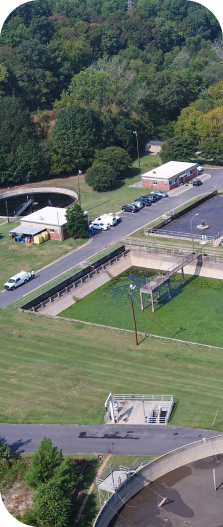
Belmont Pump Station
A new pump station and force main infrastructure to connect with the Charlotte Water collection system will be built on the site of the current Belmont Wastewater Treatment Plant. The site of the new Belmont Pump Station is located on the same property as the existing wastewater treatment plant off of North Tenth Street.
Wastewater from Belmont users will be transported to this pump station and then pumped through a force main pipe located deep beneath the Catawba River to the Paw Creek Pump Station. During Phase 1 of the Project, Belmont’s wastewater flows will be treated at the Irwin Creek Wastewater Treatment Plant. During Phase 2 of the Project, Belmont’s wastewater flows will begin being treated at the expanded Stowe Regional Water Resource Recovery Facility.
The City of Belmont is currently studying its available options for the decommissioning of the existing wastewater treatment plant on the same property.
Construction Schedule: 2024 - 2027
*Please note that schedules are approximate and subject to change
Force Mains
To install the Force Main Pipes, our Team will use a technique called horizontal directional drilling. Horizontal Directional Drilling (HDD) is considered one of the most environmentally safe methods to install a pipeline since there is a minimal ground disturbance on the surface as compared to a trench-installed pipe. HDD is a common technique used by many types of utilities to install long pressure pipes under features like water bodies or major roadways.
This horizontal directional drilling and pipe installation technique will occur in three locations for this project:
- Two force main pipes will be installed under the Catawba River and Long Creek to link the Mount Holly Pump Station to the Long Creek Pump Station.
- Two force main pipes will be installed under Long Creek to connect the Long Creek Pump Station and Stowe Headworks and Influent Pump Station to the Stowe Water Resource Recovery Facility.
- Another two force main pipes will be installed under a different section of the Catawba River to link the Belmont Pump Station to the Paw Creek Pump Station.
Construction Schedule: 2022 - 2027
*Please note that schedules are approximate and subject to change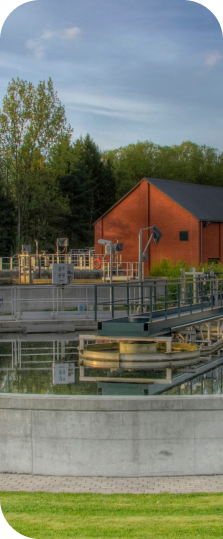
Regional Solids Transfer Project
The Regional Solids Transfer Project is a multi-year, multi-phase project that Charlotte Water is implementing to diversify biosolids management. A key component of this project is to implement a regional strategy for processing biosolids. Biosolids from the Sugar Creek Wastewater Treatment Plant, the Irwin Creek Wastewater Treatment Plant, and the future Stowe Water Resource Recovery Facility will be transferred to and treated at the McAlpine Creek Wastewater Management Facility. The biosolids generated at the Stowe facility will be pumped to the McAlpine Regional Biosolids Advanced Treatment Facility for treatment.
Phase 1A of the Regional Solids Transfer Project will construct underground pipelines connecting the Stowe Regional Water Resource Recovery Facility to the McAlpine Creek Wastewater Treatment Plant. These underground pipelines will transport biosolids from the Stowe facility to the McAlpine Creek Plant for treatment. Phase 1A of the Regional Solids Transfer Project will construct underground pipelines connecting the Stowe Regional Water Resource Recovery Facility to the McAlpine Creek Wastewater Treatment Plant. These underground pipelines will transport biosolids from the Stowe facility to the McAlpine Creek Plant for treatment.
Construction Schedule: Construction is planned to begin in 2024.
Construction Process
Construction began in February 2022 and the entire project is expected to be completed in 2026.
In general, construction will include activities such as: surveying, tree clearing and vegetation removal, environmental controls, earthwork (excavation, importing fill, grading, etc.), building stone roads and work sites, drilling and rock hammering, pouring concrete, building the facility components, large equipment deliveries, electrical work, testing and commissioning, and finally restoration.
Construction will be occurring in phases for each project component, so some of these activities may be occurring at the same time or iteratively depending on the location.
Construction FAQ's
The new Stowe Facility and Long Creek Pump Station are located in a secluded area, so minimal impacts from construction noise are anticipated for the community. Residents on Belmeade Drive and visitors to the Whitewater Center may notice periods of increased truck traffic during heavy construction activities.
The Mount Holly Pump Station will be located on the same property as the existing wastewater treatment plant in Tuckaseege Park. Residents on Tuckaseege Road may notice periods of increased truck traffic and construction noise during heavy construction activities.
The Belmont Pump Station will be located on the same property as the existing wastewater treatment plant, which is primarily industrial/commercial development so minimal impacts from construction noise are anticipated for the community. Residents and businesses on Tenth and Twelfth Streets may notice periods of increased truck traffic and construction noise during heavy construction activities.
During the construction period there will be a slight increase in truck traffic along Belmeade Road. Once the construction is complete and the facility is operational the daily truck traffic is minimal and primarily for periodic deliveries (approximately 30 vehicles per day).
There are three trails located on Charlotte Water’s property that needed to be closed for public safety during the construction of the project: the Whitewater Center’s Tortuga Trail and Needle Trail, and the Carolina Thread Trail’s Long Creek Preserve Trail. The Whitewater Center has built the new Field Trip Trail to offset the closure of these trails.
The project will have no impact on the A&E Riverfront Trail or Riverhawk Greenway in Mount Holly.
Force Main Installation Process
For Charlotte Water to provide wastewater treatment services, wastewater from Mount Holly and Belmont must be pumped through force main pipes. These pipes will be located in the bedrock deep below the Catawba River and Long Creek.
To install these pipes, our team will use a technique called horizontal directional drilling - or HDD. This is a construction technique where a tunnel is drilled into underground bedrock and then a pipeline is pulled through that tunnel. This tunnel will be 65 to 75 feet under the bottom of the Catawba River and Long Creek.
Horizontal Directional Drilling is one of safest ways to install pipes under a river, because there is a minimal ground disturbance compared to a surface installation. HDD is an industry-preferred method for installing long pipelines under bodies of water and was selected specifically for this project following extensive construction methodology evaluations.
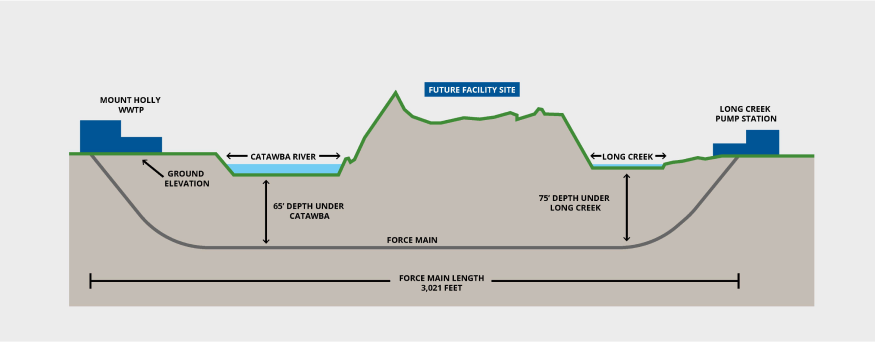
Diagram of HDD Installation
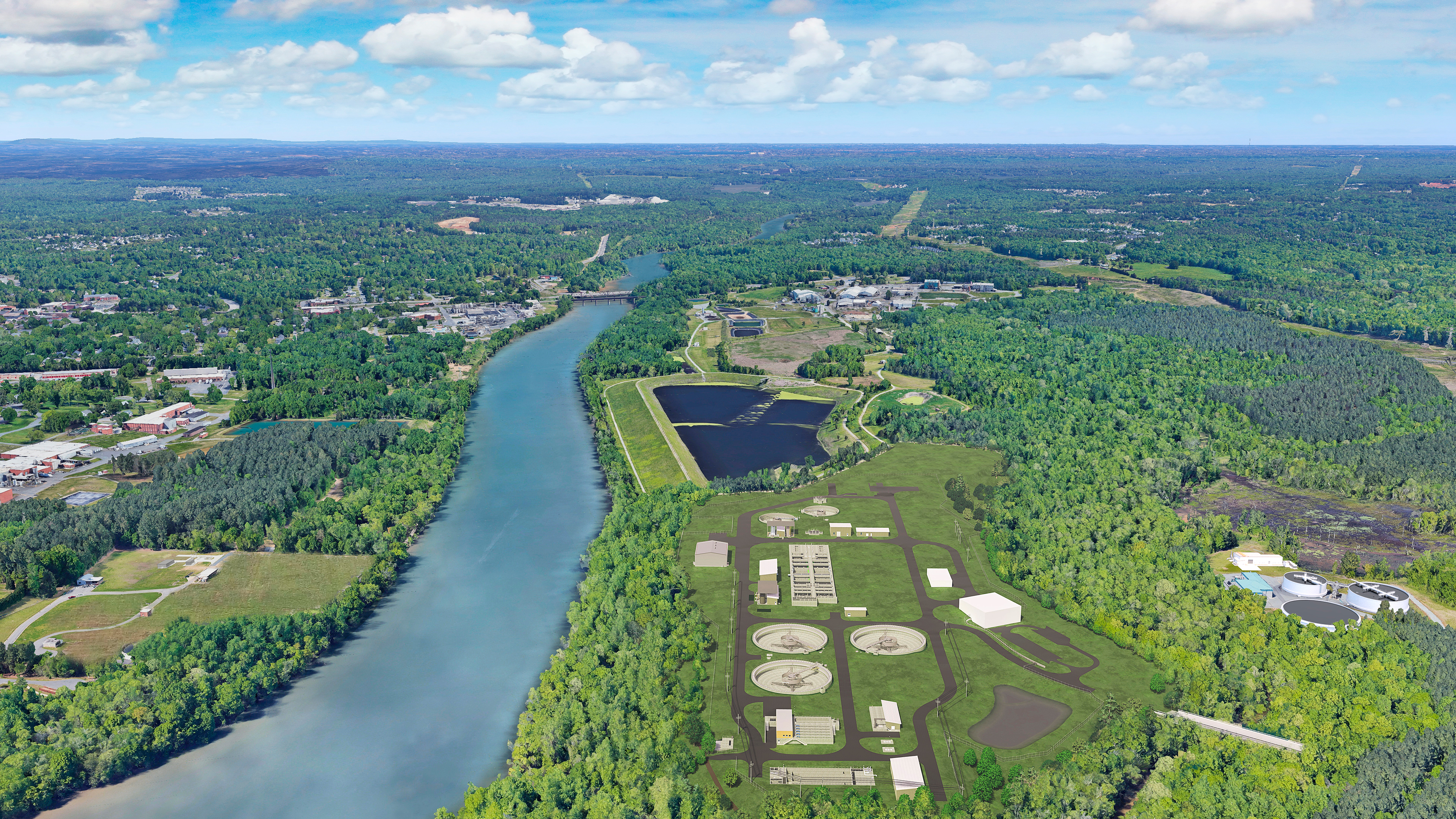
Visualization of the New Stowe Facility
Frequently Asked Questions
Click on the icons below to read the FAQs about each topic.
There have been a variety of community touchpoints and opportunities for community members to provide feedback during the planning process for the Stowe Regional Water Resources Recovery Facility.
Our team has also created a Community Stakeholder Committee for this project that includes a representative from the following institutions and organizations: Catawba Lands Conservancy; Crescent Communities; Out Teach; Sierra Club North Carolina; DRB Group; U.S. National Whitewater Center; Whitewater Middle School; Catawba Riverkeeper Foundation; Gaston County; Mount Holly Utilities Committee; and Mount Holly Chamber of Commerce.
Over the past two years, we have been working collaboratively with members of our Community Stakeholder Committee as we have developed plans for the Stowe Regional Water Resource Recovery Facility and the associated Community Benefit Project. We have listened closely to our committee members to make sure that we clearly understand the interests and needs of the project community. We are also working to minimize any potential impacts that could negatively affect members of the project community.
Many of Charlotte Water’s treatment facilities are next to parks, biking trails, and other amenities and we pride ourselves on being a good neighbor. For more than thirty years, Charlotte Water has operated a large pumping facility (the Long Creek Pump Station) next to the U.S. National Whitewater Center (USNWC). The existing USNWC trail network was constructed around the Long Creek Pump Station. To date, there have not been any negative impacts associated with this facility’s proximity to the USNWC or its trails.
During construction of the Stowe Regional Water Resource Recovery Facility, trail visitors may notice some additional traffic related to facility construction. Charlotte Water is committed to protecting the safety of trail visitors during construction and is coordinating with the USNWC and Carolina Lands Conservancy to develop plans to reroute impacted trails and mitigate any potential impacts. Charlotte Water and USNWC are communicating on schedules to minimize impacts to any events being held at the Whitewater Center. Charlotte Water understands how important the U.S. National Whitewater Center is to the community as a recreational resource.
Out of 50 miles of the current U.S. National Whitewater Center (USNWC) trail network, about 2.5 miles of trails extend onto City of Charlotte property. These 2.5 miles of trails were built under a temporary joint-use agreement with Charlotte Water. There is also about half a mile of trails that are part of the Carolina Thread Trail network that extends onto City of Charlotte property. These trails were also built under a joint-use agreement with Charlotte Water. Currently, Charlotte Water is working with the Catawba Lands Conservancy (the organization that maintains the Carolina Thread Trails) and the USNWC to develop plans to reroute impacted trails and mitigate any potential impacts. Charlotte Water understands how important these trails are to the community and will continue to work with the USNWC and the Catawba Lands Conservancy to ensure that these trail networks continue to be a recreational resource for the community.
Due to significant traffic volumes on Whitewater Center Parkway, Charlotte Water determined that a dedicated access road to the Stowe Regional Water Resource Recovery Facility needs to be constructed. Currently, Charlotte Water is designing an access road located off Belmeade Drive. Until this road is constructed, Charlotte Water will need to use the existing access to the Long Creek Pump Station off of Whitewater Center Parkway. Charlotte Water and USNWC are communicating on schedules to minimize impacts to any events being held at the Whitewater Center.
Given the location of the Stowe Facility it is expected that the only people likely to smell or hear the new Stowe Facility would be the trail users in that immediate area. Most of the wastewater to be treated at the Stowe Facility is already being pumped from that location and has been for over 30 years with very limited noise or odors. The Stowe Facility will incorporate the most modern equipment that is typically much quieter than facilities in past decades and has design features specifically to minimize odors being generated.
The Stowe Facility will be required to treat wastewater to a much higher standard than is being required of the existing Mount Holly or Belmont treatment plants so while there will be an increased volume of water discharged to the river it will be of a higher quality.
Horizontal directional drilling actually helps to minimize impacts to the environment in comparison to traditional construction methods. The project will be installing the force main pipes 65-70 feet below the river, so the work will not effect wildlife in the river during work. We will be working from an entry and exit site on either side of the river. All of the materials used for drilling are environmentally friendly and approved for use by environmental regulatory agencies. The project does not anticipate any impacts to wildlife or water quality as a result of this work. If you would like to learn more about horizontal directional drilling, please contact us.
The new Stowe Facility and Long Creek Pump Station are located in a secluded area, so minimal impacts from construction noise are anticipated for the community. Residents on Belmeade Drive and visitors to the Whitewater Center may notice periods of increased truck traffic during heavy construction activities.
The Mount Holly Pump Station will be located on the same property as the existing wastewater treatment plant in Tuckaseege Park. Residents on Tuckaseege Road may notice periods of increased truck traffic and construction noise during heavy construction activities.
The Belmont Pump Station will be located on the same property as the existing wastewater treatment plant, which is primarily industrial/commercial development so minimal impacts from construction noise are anticipated for the community. Residents and businesses on Tenth and Twelfth Streets may notice periods of increased truck traffic and construction noise during heavy construction activities.
During the construction period there will be a slight increase in truck traffic along Belmeade Road. Once the construction is complete and the facility is operational the daily truck traffic is minimal and primarily for periodic deliveries (approximately 30 vehicles per day).
There are three trails located on Charlotte Water’s property that needed to be closed for public safety during the construction of the project: the Whitewater Center’s Tortuga Trail and Needle Trail, and the Carolina Thread Trail’s Long Creek Preserve Trail. The Whitewater Center has built the new Field Trip Trail to offset the closure of these trails.
The project will have no impact on the A&E Riverfront Trail or Riverhawk Greenway in Mount Holly.
Customer Impacts
See how this project impacts you. Who is your current wastewater provider?
This partnership will allow the City of Mount Holly to provide more cost-effective and environmentally conscious wastewater management services to our residents and customers. This will also ensure that we have the necessary infrastructure and treatment capacity to manage future wastewater flow projections.
Charlotte Water will provide services for our wastewater treatment needs only. The City of Mount Holly Utilities Department will continue to provide water treatment services for the community.
The City of Belmont is working alongside Charlotte Water every step of the way on this regional project. We want to ensure our residents continue to receive excellent, undisrupted wastewater service. In coordination with the construction of the Stowe Regional WRRF, Belmont will construct a new pumping facility to send wastewater flows to the Charlotte Water system. The new pumping facility will be built at the site of our current Belmont Wastewater Treatment Plant. This will allow us to repurpose many of the existing structures.
Charlotte Water customers will not experience any rate increases due to the construction of the Stowe Regional WRRF.

Contact Us
Have questions or concerns? Fill out the comment form and one of our project representatives will get in touch.
We Want to Hear from You
Stay Informed
Sign up for project updates to receive our email notifications.

